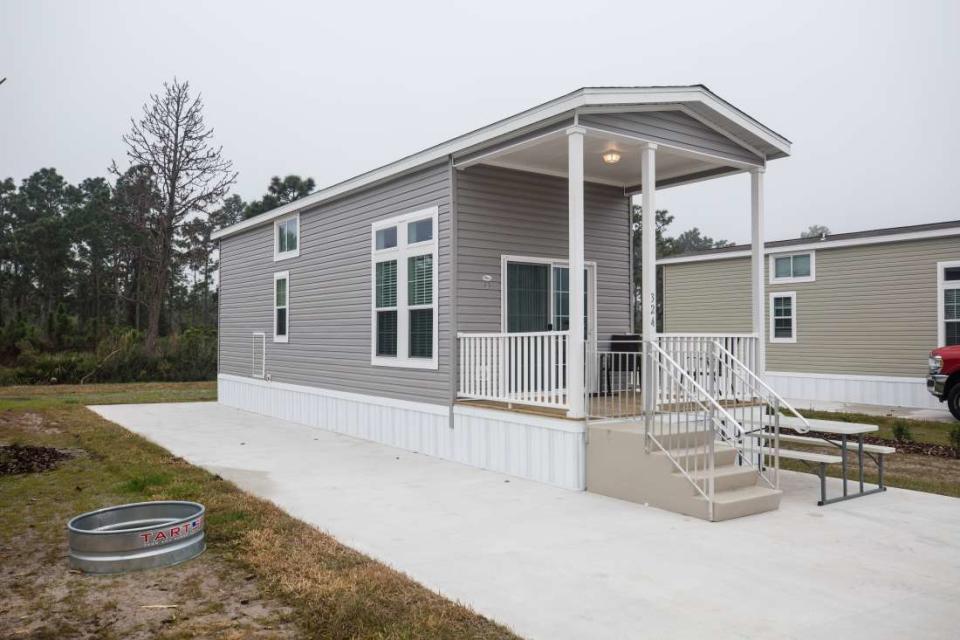Polk Planning Commission denies Canopy Oaks expansion beneath military flight path

In an ongoing battle between property rights and the preservation of military air space in rural Polk County, the Polk County Planning Commission has cleared the next step toward restricting a proposed expansion of The Resort at Canopy Oaks, a recreational vehicle park near Frostproof.
At the Nov. 2commission hearing, the panel voted 6-1 in favor of limiting what the property owner can do at the resort by prohibiting "park models" for overnight stays in the RV park.
The decision serves as a recommendation to the Polk County Commission, which has already expressed interest in keeping the density of development in the area low enough so fighter pilots can continue to train in the air space 500 feet above the resortduring certain times of the year when fewer RVs are present.
'We're out': Canopy Oaks withdraws proposal to add mobile home units at Lake Wales resort
Also: Even with mobile homes off the table, the county isn't through with Canopy Oaks

The owner wanted to increase the number of park models on the resort to give visitors without an RV a place to stay overnight. Park models are half as small as a single-wide trailer home, are hooked up to water and sewer lines on concrete pads and their tires removed from their chassis.
The owner of Resort at Canopy Oaks LLC lists David Jenkins of Lighthouse Point as the managing member in state records. The corporation purchased the resort in March for $12.3 million from Lucky Dick Promotions LLC, Polk property records show.
At the Aug. 16, County Commission meeting, Commissioner George Lindsey introduced a motion that started the process of restricting the number of park models allowed at Canopy Oaks.
"I want to memorialize the legislative intent of this board," Lindsey said in a previous Ledger report. "We struggled in good faith to find an equitable balance between private property rights and the interests of the range."
The issue first arose when Canopy Oaks requested in May that commissioners approve an application to add mobile homes to the resort. Canopy Oaks is a luxury RV resort for short-term stays, with reservations that allow guests to camp there for up to six months.
Canopy Oaks insisted that adding the mobile homes, which would offer a larger unit type for guests looking to stay at the resort who do not have their own RVs, would not transform the property into one reserved for long-term stays.
Canopy Oaks did not wait for a decision on the mobile homes and withdrew that request.
Lyndsey called the proposal "mission creep" after the commission had allowed more RVs to use the resort and vowed to change Polk's comprehensive plan to eliminate the more permanent structures.
Before the planning commission’s decision, an attorney for Canopy Oaks questioned whether the move to change wording in the land use and planning documents would preserve his client’s property rights.

He said there were just 14 park models currently on the site and the property owner has the approval for up to 400 of the units, which he said are considered RVs.
“A park trailer is an RV, it's in the code,” said Canopy Oaks attorney Simon Bloom of Atlanta.
“What I want to impress upon you is that there is this huge inferential jump that staff and Commissioner Lindsey is asking you to take and that is that if you have a park trailer or a park model it's going to be a permanent structure,” Bloom said. “That is a fallacy.”
Buck McLaughlin, who serves as range operations officer at the Avon Park Air Force Range, warned the panel that because pilots look ahead at the number of permanent structures below to determine the FAA mandated altitude at which they can safely fly, pilots would have to train at higher altitudes than they can over an RV park.
“The practice is that these do not move on a regular basis,” McLaughlin said of the park models. “In an uncongested or sparsely populated area they can fly as low as 500 feet. Once that area becomes congested now it's 1,000 feet and in this case military pilots have lost the ability to fly at 500 feet in air space that was specifically designed to accommodate low level flight routes into the range.”

Bloom countered the permanent residence issue by saying Indian Lake Estates already contains 800 detached single-family homes within a half mile of Canopy Oaks.
"This problem preexists Canopy Oaks," he said.
But McLaughlin said the minimum safe altitude over Indian Lake is 3,000 feet and had been adjusted decades ago.
While Canopy Oaks was approved for room for 1,000 RVs, it has developed 411 so far and about 14 are park models, Bloom said.
While Lindsey was against the proposal for mobile homes from the start, he also took issue with the park model units already at Canopy Oaks. Park models, which are 400 square feet, qualify as RVs, despite not being on wheels and remaining fixed on lots.
By changing the text in the comprehensive planning documents, park models would be prohibited as well as mobile homes in RV parks.
More: As RV park and Air Force square off over mobile homes, there's no telling how it will end
Lindsey has maintained that park models are not included in a common understanding of what RVs are. If park models had been included in the conversation when Canopy Oaks was approved in 2019, the decision might have gone differently, he said.
During the planning commission meeting Sean Harper was the lone dissenting vote of the 6-1 decision with chair Rebecca Troutman, secretary David Dalton, vice-chair Rennie Heath, Brooke Agnini, Tommy Addison and Robert Beltran voting in favor.
The vote was repeated as there were two separate amendments - one to the comprehensive plan and the other to the land development code, both prohibiting park models from RV parks. Any current park models or park trailers are allowed to remain but cannot be replaced in the future.
The next step in the text change process would be for the Polk Board of County Commission to approve the amendments at a meeting, the date of which is to be determined.
Paul Nutcher can be reached at pnutcher@gannett.com.
This article originally appeared on The Ledger: Polk County takes first step toward denying Canopy Oaks expansion

